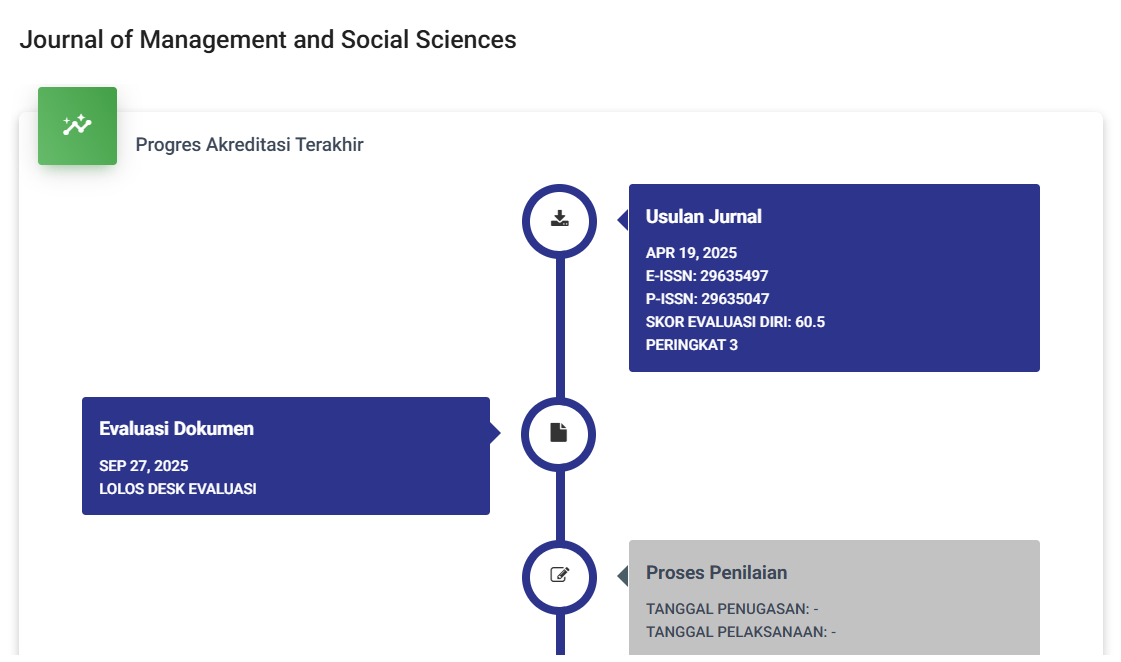Pengaruh Modal Pendidikan Kewirausahaan terhadap Pengembangan Keterampilan Kewirausahaan Mahasiswa di Kabupaten Sidoarjo
DOI:
https://doi.org/10.55606/jimas.v3i3.1431Keywords:
entrepreneurial skills, entrepeneurship education, StudentAbstract
In Indonesian universities, entrepreneurship education is one of the current trends. For this reason, students are required to take all courses on entrepreneurship. So that students can form skills through knowledge and confidence. The purpose of the empirical study is to identify the effect of entrepreneurship education on students' entrepreneurial skills. Research data were collected from students who have carried out the learning process on entrepreneurship at the University of Sidoarjo Regency. This research uses quantitative methods through survey methods to collect data from 100 respondents. The purposive sampling method is used to determine the number of samples. Furthermore, the data will be analyzed using simple linear regression analysis through SPSS. This study can show that entrepreneurship education has a significant influence on the development of students' entrepreneurial skills. The results of the study in higher education can help the entrepreneurship education curriculum to be more developed, the implementation of learning is more systematic and specific with outputs from useful education courses and stronger student entrepreneurial skills.
References
Acs, Z.J., Audretsch, D.B., & Strom, R.J. (2009). Entrepreneurship, growth and public policy. Cambridge. Cambridge University Press.
Acs, Z.J., Desai, S., & Hessels, J. (2008). Entrepreneurship, Economic Development and Institutions. Small Business Economics, 31(3), 219-234.
Adamu, L. E. (2015). Repositioning Nigeria University Education for Economic De-velopment through Entrepreneurship Education. Journal of Education and Prac-tice, 6(25), 84-89.
Almahry, F.F. & Sarea, A.M. (2018). A Review Paper on Entrepreneurship Education and Entrepreneurs' Skills. Journal of Entrepreneurship Education, 21(2), 1-7.
Arasti, Z., Falavarjani, M. K., & Imanipour, N. (2012). A Study of Teaching Methods in Entrepreneurship Education for Graduate Students. Higher Education Stud-ies, 2(1), 2-10.
Armour, J., & Cumming, D.J. (2006). The legislative road to Silicon Valley. Oxford Economic Papers, 58(4), 596- 635.
Audretsch, D. B. & Belitski, M. (2013). The Missing Pillar: The Creativity Theory of Knowledge Spillover Entrepreneurship. Small Bus Econ, 41(4), 819–836.
Audretsch, D. B. (2014). Fromthe Entrepreneurial University to The University for The Entrepreneurial Society. J Technol Transf, 39(3), 313–321.
Badri, R., & Hachicha, N. (2019). Entrepreneurship Education and Its Impact on Stu-Dents’ Intention to Start Up: A Sample Case Study of Students from Two Tunisian Universities. The International Journal of Management Education, 17(2), 182-190.
Bechard, J. P., & Toulouse, J. M. (1998). Validation of a Didactic Model for The Analysis of Training Objectives in Entrepreneurship. Journal of Business Venturing, 13(4), 317–332.
Bell, R., & Bell, H. (2016). Replicating The Networking, Mentoring And Venture Crea-Tion Benefits of Entrepreneurship Centres on A Shoestring: A Student-Centred Ap-Proach to Entrepreneurship Education and Venture Creation. Industry and Higher Education, 30(5), 334-343.
Burns, N. & S. K. Grove. (2005). The Practice of Nursing Research, Conduct, Critique, and Utilization. 5th editon. Elsevier, St Louis.
De Carolis, D. M. & Litzky, B. E. (2019). Unleashing The Potential of University Entre-Preneurship Education. New England Journal of Entrepreneurship, 22(1), 56-66.
Fayolle, A., Gailly, B. & Lassas-Clerc,N. (2006). Assessing The Impact of Entrepreneurship Educationprogrammes: a New Methodology. Journal of European Industrial Training, 30 (9).
Ghina, A., Simatupang, T. M., & Gustomo, A. (2014). A Systematic Framework for Entrepreneurship Education within a University Context. International Education Studies, 7(12), 1-19.
Hahn, D., Minola, T., Bosio, G., & Cassia, L . (2020). The Impact of Entrepreneurship Education on University Students’ Entrepreneurial Skills: A Family Embeddedness Perspective. Small Bus Econ, 55, 257–282.
Hahn, D., Minola, T., Van Gils, A., & Huybrechts, J. (2017). Entrepreneurial Education and Learning at Universities: Exploring Multilevel Contingencies. Entrep Reg Dev, 29 (9-10) 945-974.
Hayton, J. (2015). Leadership and Management Skills in SMEs, 224, UKGovernment, London.
Honig, B. (2004). Entrepreneurship Education: Toward a Model of Contingency-Based Business Planning. Academy of Management Learning & Education, 3(3), 258-273.
Jardim J, Pereira A, Vagos P, Direito I, & Galinha S. (2020). The Soft Skills Inventory: Developmental Procedures and Psychometric Analysis. Psychol Rep.,0(0),1–29.
Jardim J. (2010). Programa de Desenvolvimento de Competências Pessoais e Sociais: Estudo para a Promoção do Sucesso Académico. Edições Piaget, Lisboa, Portugal.
Khasanah, H., S. Arum, & D. Darmawan. (2010). Pengantar Manajemen Bisnis. Spektrum Nusa Press, Jakarta.
Kirby, D. (2004). Entrepreneurship Education: Can Business Schools Meet The Challenge?. Education Training, 46(8/9), 510-519.
Laukkanen, M. (2000). Exploring Alternative Approaches in Highlevel Entrepreneurship Education: Creating Micromechanisms for Endogenous Regional Growth. Entrep Reg Dev, 12(1), 25– 47.
Nian, T. Y., Bakar, R., & Islam, M. (2014). Students' Perception on Entrepreneurship Education: The Case of Universiti Malaysia Perlis. International Education Stud-ies, 7(10), 40-49.
Olugbola, S.A. (2017). Exploring Entrepreneurial Readiness of Youth and Start-Up Success Components: Entrepreneurship Training As a Moderator. Journal of Innovation and Knowledge, 2(3), 155-171.
Ozaralli, N., & N.K. Rivenburgh. (2016). Entrepreneurial Intention: Antecedents to Entrepreneurial Behavior in The USA and Turkey. Journal of Global Entrepreneurship Research, 6, 1-32.
Park, C. (2017). A Study on Effect of Entrepreneurship on Entrepreneurial Intention. Asia Pacific Journal of Innovation and Entrepreneurship,11(2), 159-170.
Politis, D. (2005). The Process of Entrepreneurial Learning: A Conceptual Framework. Entrep Theory Pract, 29(4), 399– 424.
Ratten, V., & P. Usmanij. (2021). Entrepreneurship Education: Time for A Change in Research Direction? The International. Journal of Management Education, 19(1), 1-8.
Rideout, E. C. & Gray, D. O. (2013). Does Entrepreneurship Education Really Work? A Review and Methodological Critique of The Empirical Literature on The Effects of University‐Based Entrepreneurship Education. Journal of Small Business Manage-ment, 51(3), 329-351.
Wilson, K. (2009). Educating the next wave of entrepreneurs: World Economic Forum Global Education Initiative. World Economic Forum, Geneva.
Downloads
Published
Issue
Section
License
Copyright (c) 2024 Abdul Hafidz Rosydi Fuady, Didit Darmawan

This work is licensed under a Creative Commons Attribution-ShareAlike 4.0 International License.








